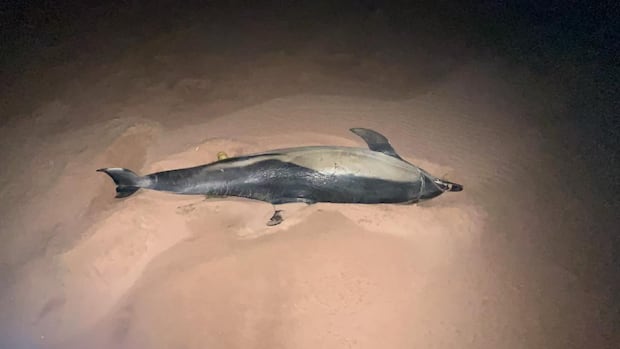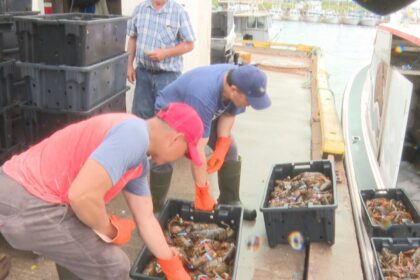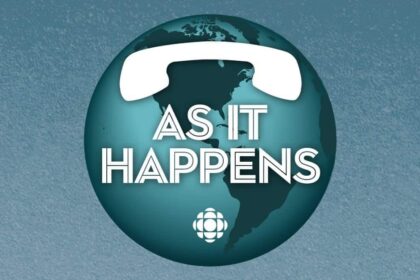PEI·NewWhen officials with MARS and the Department of Fisheries and Oceans reached the dolphin, the animal was in poor condition and response crews decided not to return the animal to the ocean. Officials with MARS say dolphin was not returned to the ocean due to animal’s poor condition, safety concerns Brittany Spencer · CBC News · Posted: Oct 14, 2025 3:04 PM EDT | Last Updated: 28 minutes ago A dolphin that was spotted in the sand on Blooming Point Beach, on the north shore of P.E.I., has died. The animal was discovered Friday evening. (MARS/Facebook)A dolphin that was found stranded on P.E.I.’s North Shore has died, and work has now begun to learn more about what led to it becoming stranded in the first place.Tonya Wimmer, executive director of the Marine Animal Response Society, said the organization received a call Friday evening from a person who was walking the beach at Blooming Point and came across a live dolphin stranded on the shoreline. She said that with the call coming in after dark, the small organization had limited ability in terms of what they could accomplish safely.“Very thankfully with this call, we also were able to get ahold of Fisheries and Oceans Canada and they actually sent out fishery officers right away,” Wimmer said. The animal was identified as a young female common dolphin, which usually lives in large groups and isn’t likely to be found alone. Wimmer said DFO officers were able to take photos and videos that could be sent back to MARS to assess the situation. She said the officers were trained on a MARS marine animal medic course, and had the knowledge needed to determine how the dolphin was doing and if it could be returned to the ocean. ‘Really the only option we had was to let the animal pass on its own,’ says Tonya Wimmer, executive director of MARS. (MARS/Facebook)“These animals are meant to be in the ocean. When they’re on a beach we have to be able to assess them to say, what’s the best course of action, is it to put them back? Which sometimes is the case, but if they’re not healthy, that’s not the best course of action for the animal.”Wimmer said she was also able to consult with a wildlife veterinarian from the Atlantic Veterinary College while assessing the animal. She said due to the animal’s poor condition, as well as safety concerns, the team decided not to return the dolphin to the ocean. “Really the only option we had was to let the animal pass on its own. You also couldn’t get a vet there to do euthanasia — that is also very dangerous obviously at night — so really, they waited and then the animal did pass on its own,” she said. Dolphin taken to AVCOfficers with DFO returned to the site the following day to retrieve the body and take it to the Atlantic Veterinary College. There, vets will try to determine why the dolphin was alone and if there are any underlying reasons for how it became stranded. Wimmer said it’s important for MARS to learn as much as possible about every stranding it responds to, so that the organization’s members can advocate for better animal conservation and protection policies moving forward. Tonya Wimmer, executive director of MARS, says it’s important for the organization to learn as much as possible about every stranding it responds to, so that members can advocate for better animal conservation and protection policies moving forward. (Zoom)“That’s a core part of the work we do,” she said. “How do we take everything we’re learning with our veterinary colleagues and, if it’s something that humans cause, how can we ensure that it doesn’t happen again?” This stranding comes weeks after three young male whales became stranded on the ocean side of a small chain of islands close to Hardys Channel, near East Bideford in western P.E.I. Wimmer said in both situations, MARS received a lot of comments from Islanders who wanted to help.”That is completely wonderful in the sense… people have the passion and the heart and compassion to want to be able to help these animals,” she said, but noted that there are many safety considerations in these types of situations, for both humans and the marine animals.”These things do happen. Sometimes they’re complete accidents on the animal’s part and sometimes we can help them, but sometimes we can’t help them out of the situation they found themselves in as well.”ABOUT THE AUTHORBrittany Spencer is a multi-platform reporter and producer with CBC Prince Edward Island. She’s covered politics, health care and the justice system. She’s a graduate of Toronto Metropolitan University’s journalism program and joined CBC in 2017. You can reach her at brittany.spencer@cbc.caWith files from Jackie Sharkey
Dolphin found stranded on P.E.I.’s North Shore dies











